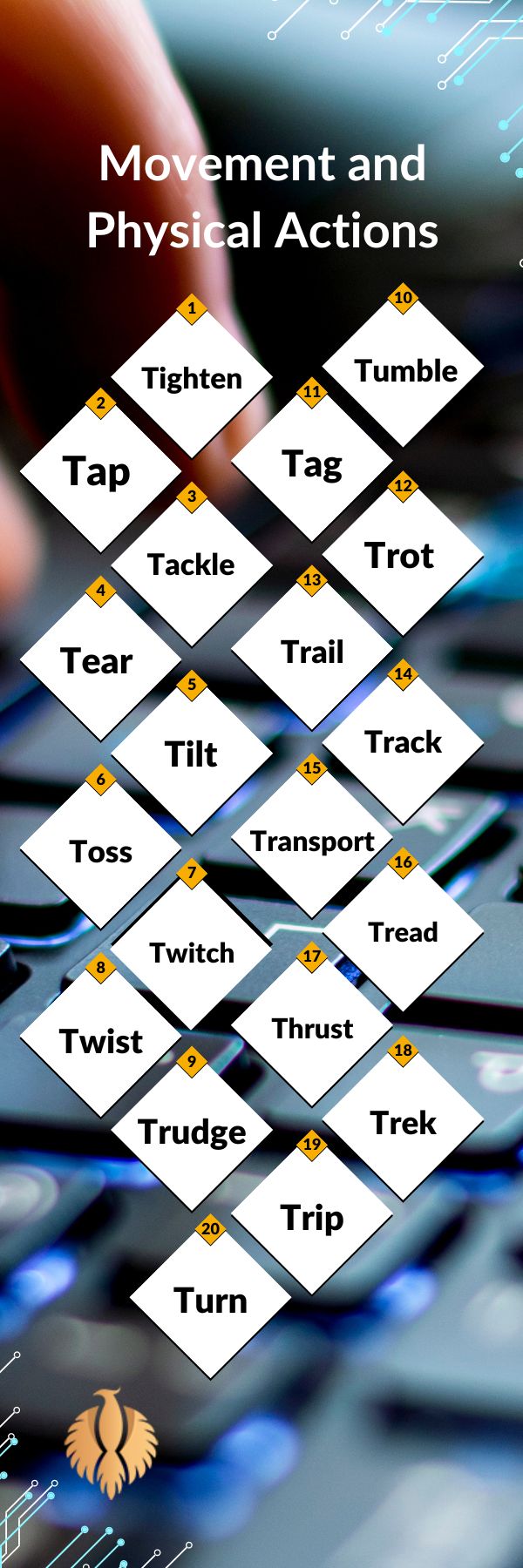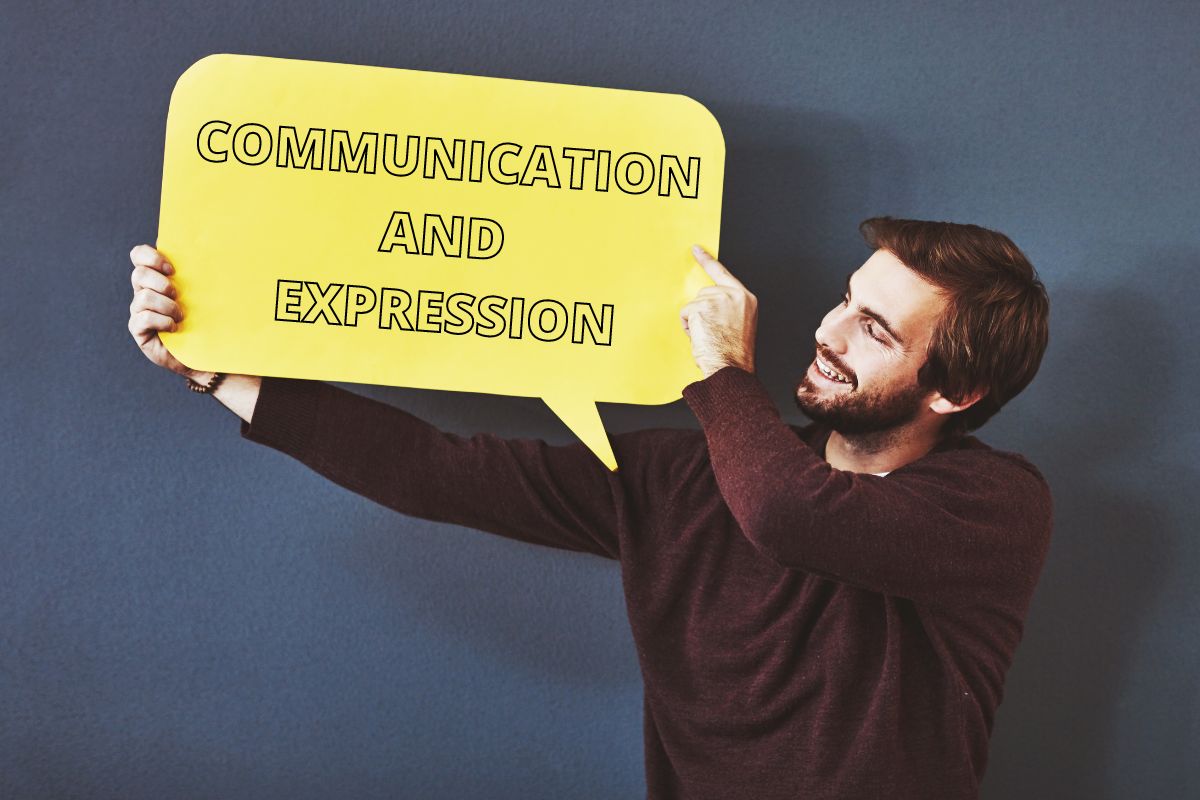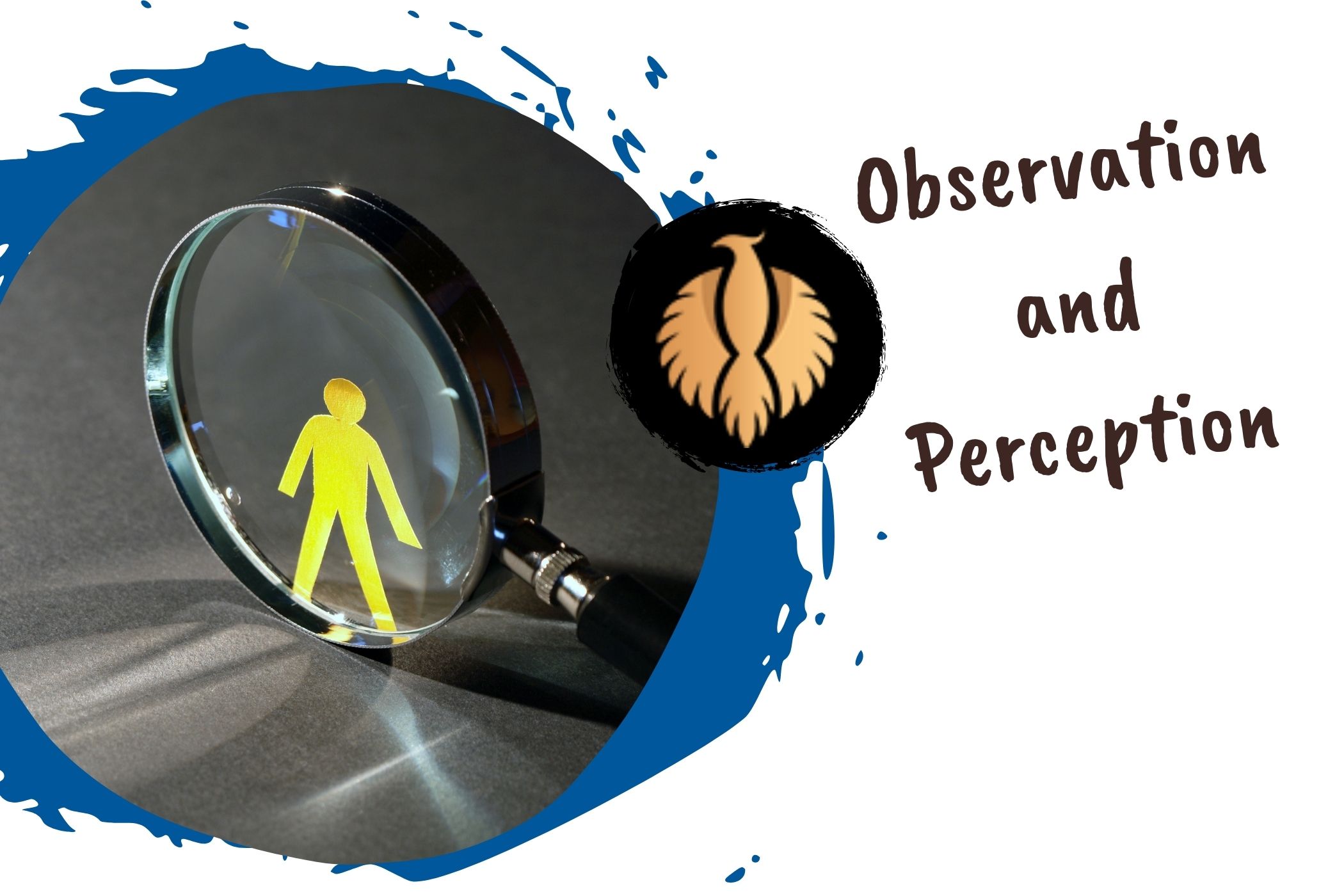Language is a powerful tool that shapes our thoughts, actions, and interactions. Verbs, in particular, serve as the engine of communication, providing structure and movement to our sentences.
They convey actions, states, and events, making them indispensable for effective communication. Among the vast array of verbs in the English language, those that start with the letter “T” hold a special place due to their frequent use and versatility.
These verbs encapsulate a wide range of human experiences and interactions, from simple actions like “talk” and “take” to more complex ones like “transcend” and “triumph.”
In this comprehensive exploration, I will delve into 100 commonly used verbs starting with “T.” By examining these verbs closely, we can gain a deeper appreciation for the richness of the English language and the various contexts in which these verbs are employed.
Each verb will be presented with detailed examples and scenarios to highlight its usage, offering a thorough understanding of their application in everyday conversation, professional communication, and literary expressions.
Understanding the nuances of these verbs not only enhances our vocabulary but also improves our ability to articulate thoughts more precisely and effectively.
Whether you are a student aiming to expand your linguistic skills, a writer seeking to diversify your expression, or simply a language enthusiast, this exploration of “T” verbs will provide valuable insights into the dynamic world of English verbs.
You might also enjoy: Top 100 Commonly Used Verbs That Start With C [2024]
Movement and Physical Actions

Verbs in this category describe bodily movements, gestures, and object manipulations. They are crucial for conveying how beings interact with their environment, move from place to place, and perform physical tasks. These verbs are foundational in both literal and figurative contexts, often forming the backbone of descriptive and dynamic narratives.
Tighten: To make or become tight or tighter.
- Example: I tightened the bolts on the bike to ensure the wheels were secured.
Tap: To strike lightly.
- Example: I tapped on the window to get her attention.
Tackle: To confront or take on a task.
- Example: I decided to tackle the project head-on.
Tear: To pull apart or rip into pieces.
- Example: I accidentally tore the paper while opening the envelope. ✉️
Tilt: To slant or bend from a vertical position.
- Example: I tilted the bottle to pour the last few drops.
Toss: To throw lightly.
- Example: I tossed the keys to my friend.
Twitch: To make a slight, sudden movement.
- Example: His eye twitched involuntarily.
Twist: To form into a bent shape.
- Example: He twisted the cap off the bottle.
Trudge: To walk slowly and with heavy steps.
- Example: After the long hike, we trudged back to the campsite.
Tumble: To fall suddenly, clumsily, or headlong.
- Example: The baby tumbled down the bed.
Tag: To attach a label to something.
- Example: I tagged my suitcase before the flight. ✈️
Trot: To move briskly.
- Example: The horse trotted around the field.
Trail: To drag or let drag along the ground.
- Example: She trailed her hand in the water as the boat moved.
Track: To follow or monitor.
- Example: I tracked my package online.
Transport: To carry from one place to another.
- Example: We transported the goods to the warehouse.
Tread: To step or walk on or over.
- Example: I tread carefully on the icy path.
Thrust: To push suddenly or violently.
- Example: He thrust the door open with great force.
Trek: To make a long, arduous journey.
- Example: We trekked through the mountains for days.
Trip: To catch one’s foot on something and stumble.
- Example: I tripped over the rug and nearly fell.
Turn: To move in a circular direction.
- Example: I turned the doorknob slowly.
Communication and Expression

These verbs are essential for describing how individuals share information, ideas, emotions, and intentions. Communication verbs play a pivotal role in any language, enabling people to interact and exchange messages. They facilitate the articulation of speech, dialogue, instruction, and other forms of verbal and nonverbal communication.
Transcribe: To make a written or typed copy of spoken material.
- Example: I transcribed the interview for the article.
Talk: To speak to provide information or express thoughts.
- Example: We talk about our plans for the weekend every Thursday.
Tell: To inform someone of something.
- Example: He told me a fascinating story about his travels.
Teach: To impart knowledge or skills.
- Example: She teaches mathematics at the local school.
Thank: To express gratitude.
- Example: I thanked him for his help.
Translate: To express in another language.
- Example: She translated the document from French to English.
Testify: To give evidence as a witness.
- Example: He testified in court about what he saw.
Taunt: To provoke or challenge with insulting statements.
- Example: They taunted him with cruel remarks.
Tease: To make fun of or attempt to provoke.
- Example: He teased his sister playfully.
Threaten: To express an intention to cause harm.
- Example: The storm threatened to ruin our picnic.
Tut: To make a disapproving sound.
- Example: She tutted at the mess on the floor.
You might also enjoy: Top 100 Commonly Used Verbs That Start With B [2024]
Mental and Emotional States

This category includes verbs that describe the inner workings of the mind and emotional moods. They reflect how individuals think, feel, and process their experiences. These verbs are vital for expressing complex thought processes and emotional responses.
Temper: To moderate or mitigate.
- Example: He tempered his criticism with praise to avoid discouraging his team.
Think: To have a particular opinion or belief.
- Example: I think we should go to the museum today.
Trust: To place confidence in someone or something.
- Example: I trust you with this important task.
Treasure: To value highly or regard as precious.
- Example: She treasures the memories of her childhood.
Tremble: To shake involuntarily.
- Example: He trembled with fear during the storm.⛈️
Thrive: To grow or develop well.
- Example: The plants thrive in the warm climate.
Triumph: To achieve a great victory or success.
- Example: They triumphed over their rivals in the competition.
Trouble: To cause distress or inconvenience.
- Example: The news troubled her deeply.
Tire: To exhaust strength or energy.
- Example: The long journey tired everyone out.
Tense: To become tight or rigid.
- Example: He tensed up when he heard the noise.
Thrill: To cause to feel a sudden excitement.
- Example: The roller coaster ride thrilled the children.
Tingle: To feel a slight prickling sensation.
- Example: Her skin tingled in the cold air.
Control and Management

These verbs describe actions involving directing, handling, organizing, and supervising tasks or situations.
They are crucial for expressing how individuals manage resources, govern their environments, and make decisions that influence outcomes.
This category includes verbs that often pertain to leadership, administration, and regulatory activities.
Tag: To label or mark for identification.
- Example: She tagged the files to keep the office organized
Take: To get into one’s possession.
- Example: I took the book from the shelf.
Train: To teach or develop through practice.
- Example: They trained the dog to fetch.
Test: To take measures to check the quality or performance.
- Example: We tested the new software for bugs.
Tame: To domesticate or bring under control.
- Example: They tamed the wild horse.
Tend: To care for or look after.
- Example: Every morning, she tends to her garden.
Terminate: To bring to an end.
- Example: They terminated the contract due to non-compliance.
Tag: To attach a label to something.
- Example: I tagged my suitcase before the flight.
Track: To follow or monitor.
- Example: I tracked my package online.
Tilt: To incline or curve from a vertical posture.
- Example: I tilted the bottle to pour the last few drops.
Tie: To fasten with a string or cord.
- Example: He tied the shoelaces tightly.
Transfer: To move from one location to another.
- Example: She transferred the funds to her new account.
Transpose: To change the order or position of.
- Example: The musician transposed the piece to a different key.
Thwart: To prevent from accomplishing a purpose.
- Example: They thwarted his attempts to escape.
Tint: To color slightly.
- Example: She tinted the glass to reduce glare.
Tally: To count or record.
- Example: They tallied the votes after the election.
Total: To sum or add up.
- Example: I totaled the receipts for the expense report.
You might also enjoy: Top 100 Commonly Used Verbs That Start With P [2024]
Creation and Transformation

Verbs in this category describe actions related to making, modifying, and forming. They are vital for conveying the processes of creation, adaptation, and transformation in various contexts, including art, construction, and personal development. These verbs emphasize the dynamic nature of change and innovation.
Temper: To heat and then cool a material to achieve a desired hardness or elasticity.
- Example: The blacksmith tempered the steel to make a durable sword. ️
Trace: To follow the outline of.
- Example: She traced the pattern on the paper.
Tailor: To create or adapt for a certain purpose.
- Example: He tailored the suit to fit perfectly.
Transcribe: To put thoughts into written form.
- Example: The secretary transcribed the meeting notes. ️
Transform: To change in form or appearance.
- Example: The marriage transformed their relationship.
Transcend: To go beyond the limits of.
- Example: His performance transcended all expectations.
Thread: To pass a thread through the eye of a needle.
- Example: She threaded the needle easily.
Trim: To make something neat by cutting.
- Example: He trimmed the hedge to shape it.
Tinker: To attempt to repair something in a casual way.
- Example: He tinkered with the old car in his spare time.
Tweak: To make small adjustments to.
- Example: She tweaked the recipe to improve the flavor.
Translate: To express in another language.
- Example: She translated the document from French to English.
Taper: To become gradually narrower.
- Example: The road tapered to a narrow path.
Tinge: To add a slight amount of color.
- Example: The sunset tinged the sky with pink hues.
Twine: To wind or spiral around something.
- Example: The ivy twined around the fence.
Tweak: To make small adjustments.
- Example: She tweaked the design for better balance.
Tailor: To create or adapt for a certain purpose.
- Example: He tailored the suit to fit perfectly.
Observation and Perception

These verbs relate to actions involving looking, noticing, and interpreting. They are essential for describing how individuals perceive their surroundings and interpret sensory information. This category of verbs is crucial for articulating how we see, analyze, and understand the world around us.
Track: To follow or monitor.
- Example: I tracked my package online.
Test: To take measures to check the quality or performance.
- Example: We tested the new software for bugs.
Tune: To adjust for proper functioning.
- Example: He tuned the guitar before the performance.
Tickle: To touch lightly causing a tingling sensation.
- Example: The feather tickled her nose.
Twinkle: To glow with a brilliant or flashing light.
- Example: The stars twinkled in the night sky.
Tend: To care for or look after.
- Example: She tends to her baby very much.
Taint: To contaminate or pollute.
- Example: The water was tainted by the chemical spill.
Tap: To strike lightly.
- Example: I tapped on the window to get her attention.
Treasure: To value highly or regard as precious.
- Example: She treasures the memories of her childhood.
Tremble: To shake involuntarily.
- Example: He trembled with fear during the storm.
Trail: To drag or let drag along the ground.
- Example: She trailed her hand in the water as the boat moved.
Theorize: To form a theory or set of theories about something.
- Example: Scientists theorize about the origins of the universe.
You might also enjoy: Top 100 Commonly Used Verbs That Start With R [2024]
Problem Solving and Decision Making

Verbs in this category describe actions related to solving problems, making decisions, and planning.
They are essential for communicating how individuals approach challenges, develop strategies, and implement solutions. These verbs are vital for conveying cognitive and executive functions in various contexts.
Tackle: To confront or take on a task.
- Example: I decided to tackle the project head-on.
Think: To have a particular opinion or belief.
- Example: I think we should go to the museum today.
Trust: To place confidence in someone or something.
- Example: I trust you with this important task.
Triumph: To achieve a great victory or success.
- Example: They triumphed over their rivals in the competition.
Tend: To care for or look after.
- Example: They tends to their pets a lot.
Trouble: To cause distress or inconvenience.
- Example: The news troubled her deeply.
Transcend: To go beyond the limits of.
- Example: His performance transcended all expectations.
Transfer: To move from one location to another.
- Example: She transferred the funds to her new account.
Translate: To express in another language.
- Example: She translated the document from French to English.
Tune: To adjust for proper functioning.
- Example: He tuned the guitar before the performance.
Tally: To count or record.
- Example: They tallied the votes after the election.
Triangulate: To determine the location of something by forming triangles to it from known points
- Example: The team triangulated the position of the missing hiker using the GPS coordinates.
Conclusion
The one hundred verbs beginning with “T” showcase the diverse and extensive nature of the English language.
Each verb carries its unique meaning and can describe a wide array of actions, emotions, and situations, depending on the context.
This collection of verbs highlights the richness and versatility of English, demonstrating how a single letter can lead to many expressive possibilities.
Understanding and using these verbs proficiently enhances both written and spoken communication, making it more precise and expressive.
For instance, verbs like “transform” and “transcend” can elevate a narrative, adding depth and nuance to the description of changes and surpassing limits. Meanwhile, verbs such as “tackle” and “triumph” convey determination and success, inspiring and motivating the audience.
The ability to choose the right verb can significantly impact the clarity and impact of the message being conveyed.
This exploration underscores the importance of verbs in language and fosters a deeper appreciation for their role in everyday discourse. Verbs are the engines of sentences, driving the action and connecting the subject with the predicate.
They are essential for constructing meaningful and dynamic statements, whether in casual conversation, formal writing, or creative storytelling.
By expanding our vocabulary with these “T” verbs, we can enhance our ability to communicate effectively and creatively.
Moreover, the study of these verbs reveals the interconnectedness of language and culture. Many of these verbs have roots in Latin, Greek, or other languages, reflecting the historical influences that have shaped English.
For example, “translate” comes from the Latin “translatus,” meaning “carried across,” while “teleport” combines the Greek “tele,” meaning “distant,” with “port,” meaning “carry.”
This etymological insight enriches our understanding of the words we use and their evolution over time.
Whether in storytelling, instruction, or conversation, these verbs provide the means to convey our thoughts and experiences vividly and accurately.
In storytelling, verbs like “tantalize” and “terrify” can evoke strong emotions, drawing the reader into the narrative and creating a memorable experience.
In instructional contexts, verbs such as “teach” and “train” are fundamental for imparting knowledge and skills, and guiding learners through the process of understanding and mastery.
In everyday conversation, verbs like “talk” and “think” facilitate the exchange of ideas and the expression of personal perspectives.
Furthermore, the versatility of these verbs allows for creative and nuanced expression. For example, the verb “tinker” suggests a playful and experimental approach to problem-solving, while “tether” implies a sense of connection and restraint.
By selecting the appropriate verb, we can convey subtle shades of meaning and emotion, enhancing the richness of our communication.
In conclusion, the exploration of these one hundred verbs beginning with “T” not only highlights the diversity and depth of the English language but also emphasizes the crucial role that verbs play in effective communication.
By mastering these verbs, we can improve our ability to articulate our thoughts and experiences with precision and flair.
This linguistic journey fosters a greater appreciation for the power of words and inspires us to continue expanding our vocabulary and honing our communication skills.
Whether we are writing a novel, delivering a speech, or engaging in a casual chat, these verbs equip us with the tools to express ourselves more vividly and accurately, enriching our interactions and connections with others.

Hi, welcome to my blog! My name is Omid and I am thrilled to have you here! I am an English language teacher with 12 years of experience and hold multiple international certifications (TESOL, IELTS, TOEFL, PTE, CELTA). Additionally, I hold a PhD in Applied Linguistics with a specialization in Teaching English as a Second Language (TESL), which fuels my passion for teaching English and assisting others in mastering the language. To me, nothing is more rewarding than helping individuals enhance their English language abilities through various methods. So, let’s embark on this journey of learning English together.




